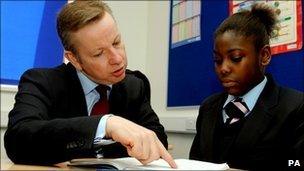NASUWT union votes 'no confidence' on Gove policies
- Published

The NASUWT teachers' union annual conference has passed a motion saying it has "no confidence" in government policies for education in England.
General secretary Chris Keates also accused Education Secretary Michael Gove of "educational vandalism" in a "report card" on his time in office.
He had "damaged school buildings" and lacked "attention to detail", she said.
But the schools minister said the government wanted to extend better opportunities to vulnerable children.
Nick Gibb, addressing the annual conference in Glasgow, said the government was driven by a "mission to make opportunity more equal".
But a resolution passed by delegates called for a campaign by all means necessary, including industrial action, to ensure a "national system of state education".
It included an amendment that said teachers "have no confidence in the education policies of the Coalition Government".
The text of the motion said: "The concerted political assault on teachers; the experiment with the diversity of providers in state education; increased autonomy for schools; and opening up the school system to marketeers and profiteers are a recipe for chaos".
This would "continue to disenfranchise and disadvantage the vast majority of children, young people and the workforce", it said.
'Behaving badly'
Ms Keates styled her address as a school report on Mr Gove's behaviour, drawing laughter from the floor as she referred to a wide range of decisions he has made which the union has opposed.
She said Mr Gove had been "involved in some educational vandalism" by "trying to break up the national pay and conditions framework".
She added that he had been "getting into trouble over damage to school buildings", in his decision to scrap the Building Schools for the Future programme, which the government said was wasteful.
The education secretary had been "caught encouraging others to behave badly" by "encouraging covert decision-making by heads and governors to minimise opposition - disenfranchising parents, local communities, staff and trade unions" as schools moved to become academies, she said.
'Dissatisfaction'
He "really must pay more attention to detail" in his claims that England is dropping down international education league tables, she said.
She said that a recent OECD analysis had judged the UK to have met rigorous criteria that Sweden - an example Mr Gove often refers to - had not.
"His behaviour isn't helped by the fact that he has made some poor subject choices," Ms Keates said, as the English Baccalaureate championed by Mr Gove is "far too narrow for such a clever pupil".
The EBacc is to be awarded to any student gaining good GCSE passes in English, maths, two science qualifications, a language and history or geography, but has been criticised for excluding subjects such as music, art, design and technology and RE.
"Michael has had one success," Ms Keates concluded. "In 12 months he has managed to generate the levels of dissatisfaction among teachers that it took the last Tory government 18 years to achieve.
"Now at the NASUWT we don't like to give up on anybody but I am afraid state education is just not right for Michael. I think a managed move might be on the cards."
Pension 'anxieties'
Mr Gibb, addressing the conference before Ms Keates spoke, said Mr Gove's own upbringing "ignited a burning passion to extend better opportunities to the most vulnerable children", he said.
He said the government was cutting bureaucracy, boosting teachers' professional development and reducing prescription about how to teach, as well as extending free child care to disadvantaged two-year-olds and directing the £2.5bn pupil premium to benefit the poorest school students.
Mr Gibb was speaking less than a week after he was heckled as he addressed another teaching union, the Association of Teachers and Lecturers, over government plans to change the teachers pension scheme.
Mr Gibb told NASUWT members he acknowledged that proposals by Lord Hutton, in his review of public sector pensions, "had given rise to huge anxieties".
He said the government was determined to retain defined benefit schemes, and was committed to ensuring that benefits already built up in teachers' pensions were not affected.
The Department for Education is due to set out its proposals to alter staff pensions in the autumn.
Lord Hutton recommended that nurses, teachers and most other public sector staff work until at least 65, and receive pensions linked to career-average earnings, rather than final salaries.
The National Union of Teachers voted on Saturday to hold a ballot for strike action on the issue, but NASUWT says it will pursue negotiations first.
'Difficult choices'
Mr Gibb also defended the schools budget, after shadow education secretary Andy Burnham criticised the government in a speech on Saturday, saying schools faced falling budgets.
The schools minister said the coalition government had faced "difficult choices" as it inherited a budget deficit "that was costing £120m in interest each and every day - enough to build 10 new primary schools, every single day".
He said he was "proud" of the school budget settlement, under which per pupil spending has been maintained in cash terms to 2014-5, as other public services faced cuts.
Mr Burnham had said this means school spending will still fall by 1.1% in real terms over the next four years.
- Published23 April 2011
- Published23 April 2011
- Published10 January 2011
- Published7 April 2011
- Published7 December 2010
- Published2 December 2010
- Published24 November 2010